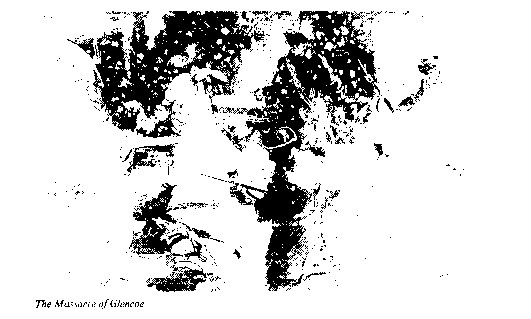
49
from the country. The Parliament decided that James II had lost his right to the Crown.
Mary and William began to reign jointly, moreover, the Parliament decided that William would rule on in
the event of Mary's prior death.
The political events of 1688 were called "the Glorious Revolution" as they had realized the bourgeois
theories of the nature of government (John Locke (1632-1704)) and the demands that the powers of the King
should be restricted and that the Parliament should be overall power in the state.
Though some historians insist on calling it a coup d'etat of the ruling classes, the changes are recognized as a
historic turning point in the conception and practice of government. In point of fact it can be justly regarded as
a "glorious compromise" between the new bourgeoisie and the old feudal institutions like the Monarchy, the
House of Lords, etc, but also in imposing new bourgeois parliamentary privileges and relations. The Parliament
secured its superiority by adopting the Bill of Rights in 1689 and the Monarchs – William III and Mary II
accepted the conditions advanced by the Parliament:
the legislative and executive power of the Monarchs was limited. The Bills passed by the Parliament were to
be subjected to the Royal Assent, but the Monarch could not refuse to sign there. The Monarchs could not
impose taxes,
the Army could be kept only with the Parliament's permission.
In 1701 the Parliament passed the Act of Settlement that secured Protestant succession to the throne of
England and Ireland, outlawing any Catholic Pretenders. The Act stipulated that if William and Mary had no
children, the Crown should pass to Mary's sister Anne. And if Anne died childless too, the Crown should passto
Sophia Electress of Hannover, the granddaughter of James I Stuart, or her Protestant descendant. The Act of
Settlement is of major Constitutional importance, it has remained in force ever since.
Praising the "Glorious Revolution" as "great and bloodless", historians have to admit, however, that it was
bloodless only in England.
In Ireland there was a blood bath of war between the Protestants of Londonderry and the Catholic Irish
Parliament. King William III landed in Ireland with the British, Dutch, Danish and Huguenot troops and
defeated the Irish and French army of James II in the Battle of the River Boyne (1691).
James left Ireland for France and never returned to any of his kingdoms. The defeat in this Battle crushed the
Irish hopes for independence, the Irish Catholics lost all the rights.
In Scotland William was recognized in the Lowlands. But in the Highlands a revolt rose and the loyalty of
the Highland chiefs was bought with a large sum of money. The chiefs were to swear an oath of loyalty to the
new King, but one or two were a few days late, among them Maclau MacDonald of Glencoe. This was severely
and brutally punished by a company of troops, who were sent to
murder all the MacDonalds of Glencoe under
70. 36 Men, women and children were killed as they slept, and their houses were set on fire. Those who
escaped told the world of the Massacre of Glencoe.
The French and Jacobite gazettes condemned the King's Government as cruel and Barbarous.
The "Glorious", "bloodless" revolution was a political readjustment of the government in the interests of the
ruling classes, but it did not involve the majority of the population.

